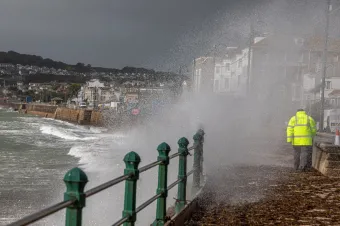
The Natural Environment Research Council (NERC) has today awarded the National Oceanography Centre (NOC) one of seven individual grants that will use cutting-edge digital technology to advance environmental outcomes.
Led by Dr Jenny Brown, NOC Coastal Oceanographer, the new project ‘Coastal REsistance: Alerts and Monitoring Technologies’ (CreamT) will develop a new point-of-impact flood hazard nowcasting system to meet national coastal management needs, which will have the potential to issue flood alerts to the National Flood Forecasting Service. This work carries on from the WireWall project which developed a novel field instrument able to measure the speed and volume of individual waves as they overtopped a sea wall.
Dr Brown said, “Our team of collaborators, including scientists, engineers and artists, are eager to tackle the challenges of the high energy coastal environments at Penzance and Dawlish. We’re thrilled to have the opportunity to benefit local communities by developing this innovative real-time flood hazard observation system, with the potential for integration into navigation systems diverting people away from flood hazard. We will also be engaging the local community in coastal hazard monitoring through the development of a self-guided coastal walk accompanied by an Augmented Reality phone app that will allow people to visualise storms during calm conditions.”
As part of the NERC-led ‘Constructing a Digital Environment’ Programme, these seven projects all seek to develop tools and systems that will tackle real-life environmental challenges. The Programme aims to construct a digitally enabled environment which benefits researchers, policy makers, businesses, communities and individuals. It is funded through the Strategic Priorities Fund.
Dr Simon Gardner, Head of Digital Environment, Strategic Partnerships Directorate at NERC, said, “The grants announced today demonstrate NERC’s commitment to environmental research. They will support important projects that are building digital tools and systems to combat environmental challenges such as flooding, tree disease and reduced biodiversity.”
The programme is supported by the Engineering and Physical Sciences Research Council (EPSRC) and the Department for Environment, Food & Rural Affairs (Defra). In total, the grants comprise an investment of more than £6 million. You can find out more about the seven successful projects, all lasting 24 months, on the NERC/UKRI website.